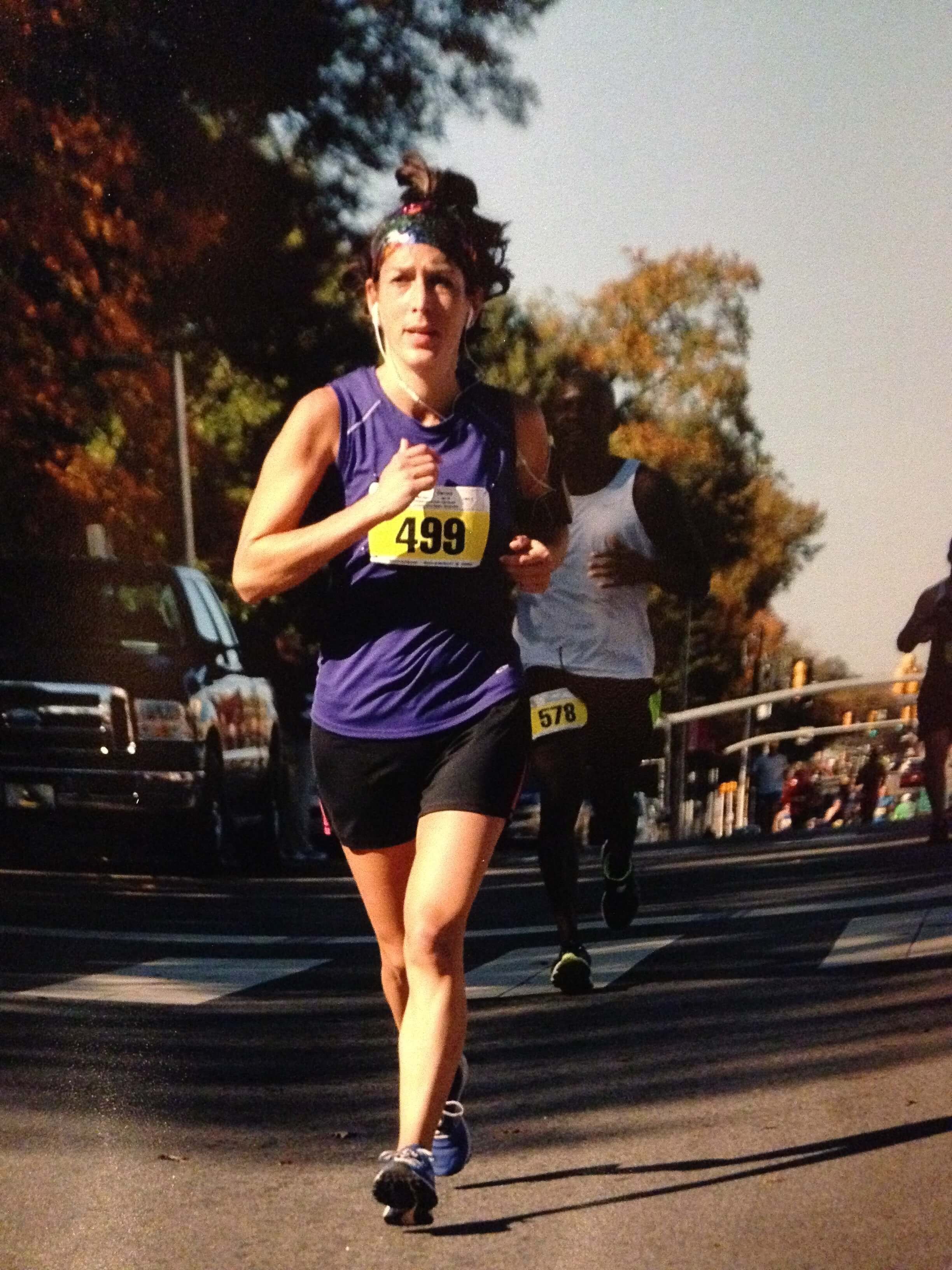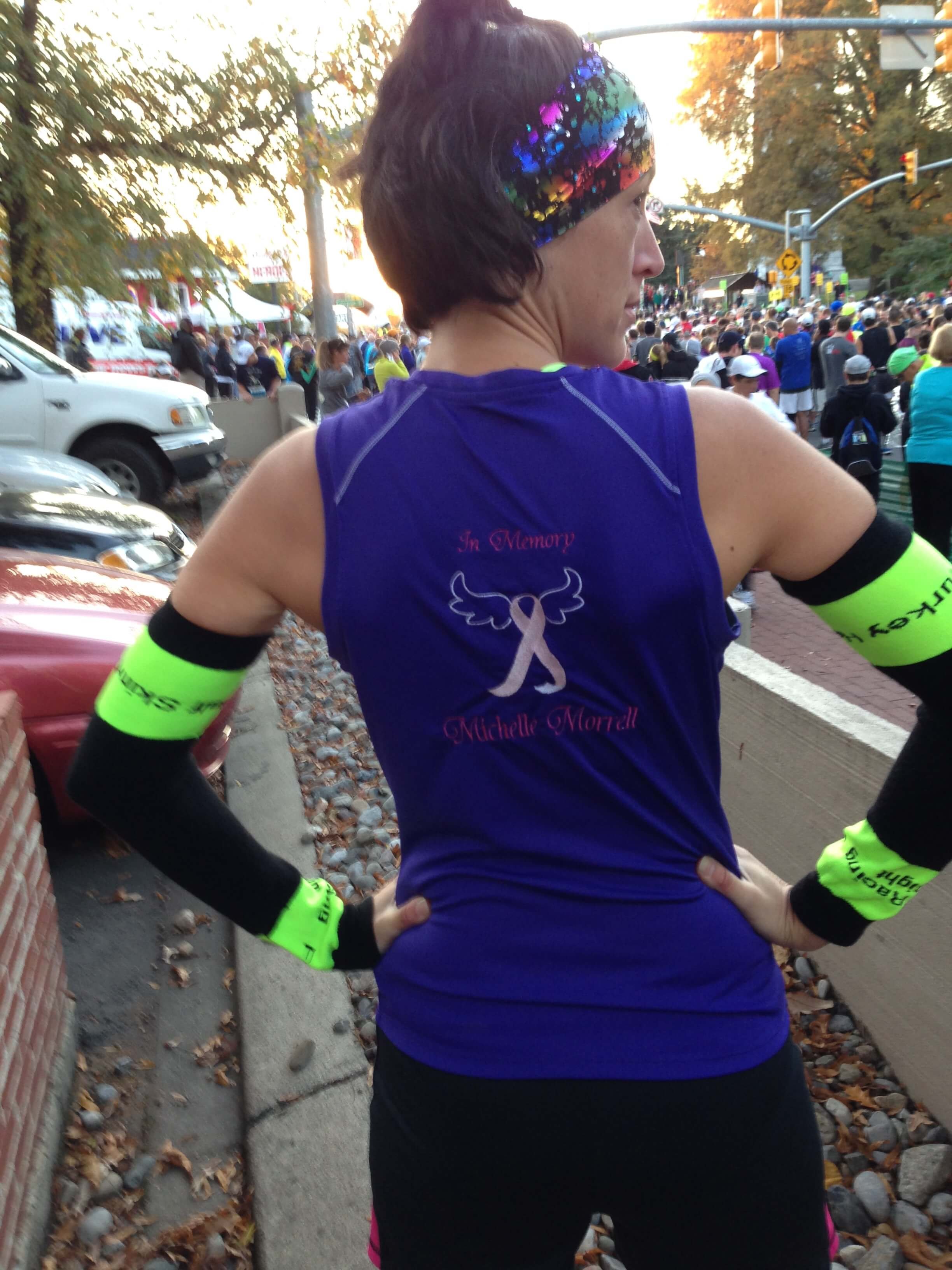Running Through Grief

I vowed that I would never run a full marathon. It requires lengthy training hours, dedication, discomfort, and it was just plain far! I was not going to do it. Nope. Never.
And then my running partner passed away.
Fifteen months after finding a lump in her breast, she was gone. She left behind a husband, a six-year-old, and a brand-new baby who she gave birth to just six weeks after her cancer diagnosis. I was devastated, confused, frustrated. I was grieving. I did not know what to do to ease the pain for her family or to comfort my own sadness. So I did the only thing I could think of— I signed up for a full marathon.

The race was less than two months away. I was training for the half so I had a good base, but I had never run more than 13.1 miles. I created a sponsorship and donation system. Sponsor me to run the full and I will give all of the money to the family my friend left behind. And that is precisely what I did. At the finish line I gave my medal to her older daughter and a check for nearly $2,000 to her husband.
Inside I was still crying but there was a part of me that was now smiling too. I had run through my grief.
Grief can come from many difference sources. Generally, people assume that grief comes when someone you love passes away, but this is not the only thing that brings it on. You grieve the loss of a relationship or a job. You grieve a medical diagnosis or bad news. You grieve over an uncomfortable change in an aspect of your life. Regardless of what you’re grieving, there is a way to run through that grief.
Doctors break the grieving process down into five stages: Denial, Anger, Bargaining, Depression, Acceptance. In order to run through grief, you have to run with purpose. Therefore, I’ve paired a type of run with each stage of grief as a guideline. I hope it helps you as it helped me.
Denial
This first stage of grief is confusing because you do not even realize you are grieving. You have not acknowledged your loss yet. Since you have not accepted your grief, you may not be running with purpose. You will find that your head feels cloudy and that you want to run. You don’t realize that the run will help you through the healing process because you do not know that you require healing. If you have experienced a loss or a change but feel unable to embrace it, try a mid-distance aerobic run. The mid-distance will give you time to reflect but not enough time to wallow. Running at an aerobic and challenging pace leaves you vulnerable. Thus, you can run yourself right into the second stage of grief before even realizing you were in the first.
Anger
Before sadness comes anger. Grief-stricken anger is ugly anger. I remember being furious at the world for giving the kindest woman I knew this horrible cancer. When it finally consumed her, I, myself was consumed. Consumed with anger. When you use this anger for a purpose, however, it can be beneficial to your mind and body. Anger has fueled some of my best workouts. This is the stage when you get through a dreaded interval workout. Give yourself permission to speed up as fast as you can go for roughly 0.25 miles. If you are running on a track, this is one time around the track or 400 meters. Pound this out and allow your deepest frustrations to surface. Then take yourself down to an easy pace for the next .25 miles. Reflect during this time. Acknowledge how you felt during the angry interval. It’s ok to acknowledge that it felt sort of good. And then, you guessed it, repeat. The number of repetitions will depend on your fitness level. Don’t let your anger fuel you to do more than your body is capable of.
Bargaining
This is the desperate stage. You would trade anything to fix whatever happened, get back what you’ve lost, and change the outcome. If you are a spiritual person you find yourself offering trades with God. God if you fix this, I promise I will go to church. Unfortunately, no amount of bargaining will change your circumstances. You just have to power through this stage. To do so requires a long, slow run. Take the time on the road to have that conversation with God, yourself, or nature. The length of the run should allow you to weigh out many different scenarios in your head. Maybe you’ll find rationale for what happened or perhaps you’ll find that your thoughts have drifted on to something else entirely. Be in the moment, whatever that moment is.
Depression
During the depression stage you will not want to get out of bed, let alone go for a run. Yet, this is the stage where running is the most helpful and the most essential. For years scientists have showed us that exercise produces endorphins. Endorphins diminish pain. You may be familiar with the term “runner’s high” which describes a sense of elation due to the release of endorphins. Running through the depression stage will expedite its progress. That euphoric sensation after you run will help knock sadness out of your system. I recommend a trail run or a run on rolling hills somewhere with a nice view. Nothing breaks depression quite like finding beauty in nature. You don’t need to do a long run or even a fast run. This as a maintenance run. You are nurturing your emotional well-being while maintaining your fitness You are getting your body moving and your mind out of its despair even if it’s only for a brief amount of time.


Acceptance
Acceptance, the fifth and final stage of grief, is embracing what caused the grief and acquiescing to the pain. It is realizing that you can’t change what has happened. Yet, it is understanding that the grief cannot and will not break you. You understand that it is ok to grieve. You looked your grief in the eye and said I accept you, but you do not have power over me.
With this stage comes new-found strength and endurance. Put those to the test. Go out of your comfort zone. Do a run that challenges you. If you’ve never done a race, maybe it’s time to sign up. If you already love races, sign up for a new one, or a longer distance. Maybe you’ll find yourself crossing the finish line of your first marathon!
Now when I race, I think of my friend. I think of the pain she endured through her treatments. I think of the strength she found when she was told that no treatment would work. I think of her and I grieve. Then I run.
Latest Articles
 Is Running on a Treadmill Easier Than Running Outside?Runners have their own preferences, whether it is treadmill running, running outside on the road, or exploring trails. So...
Is Running on a Treadmill Easier Than Running Outside?Runners have their own preferences, whether it is treadmill running, running outside on the road, or exploring trails. So... Is It OK to Use Trail Running Shoes on the Road?While trail running shoes can be used on roads, especially in situations where a runner encounters mixed terrains or pref...
Is It OK to Use Trail Running Shoes on the Road?While trail running shoes can be used on roads, especially in situations where a runner encounters mixed terrains or pref... How to Fix Sore Quads After Running?Rest, ice, gentle stretching, and over-the-counter pain relievers can help soothe sore quads after running. Also, ensure ...
How to Fix Sore Quads After Running?Rest, ice, gentle stretching, and over-the-counter pain relievers can help soothe sore quads after running. Also, ensure ... 10 Fruits With The Most Electrolytes to Replace Sports DrinksThese fruits are high in electrolytes such as potassium, magnesium, and calcium, essential for hydration, muscle function...
10 Fruits With The Most Electrolytes to Replace Sports DrinksThese fruits are high in electrolytes such as potassium, magnesium, and calcium, essential for hydration, muscle function...

